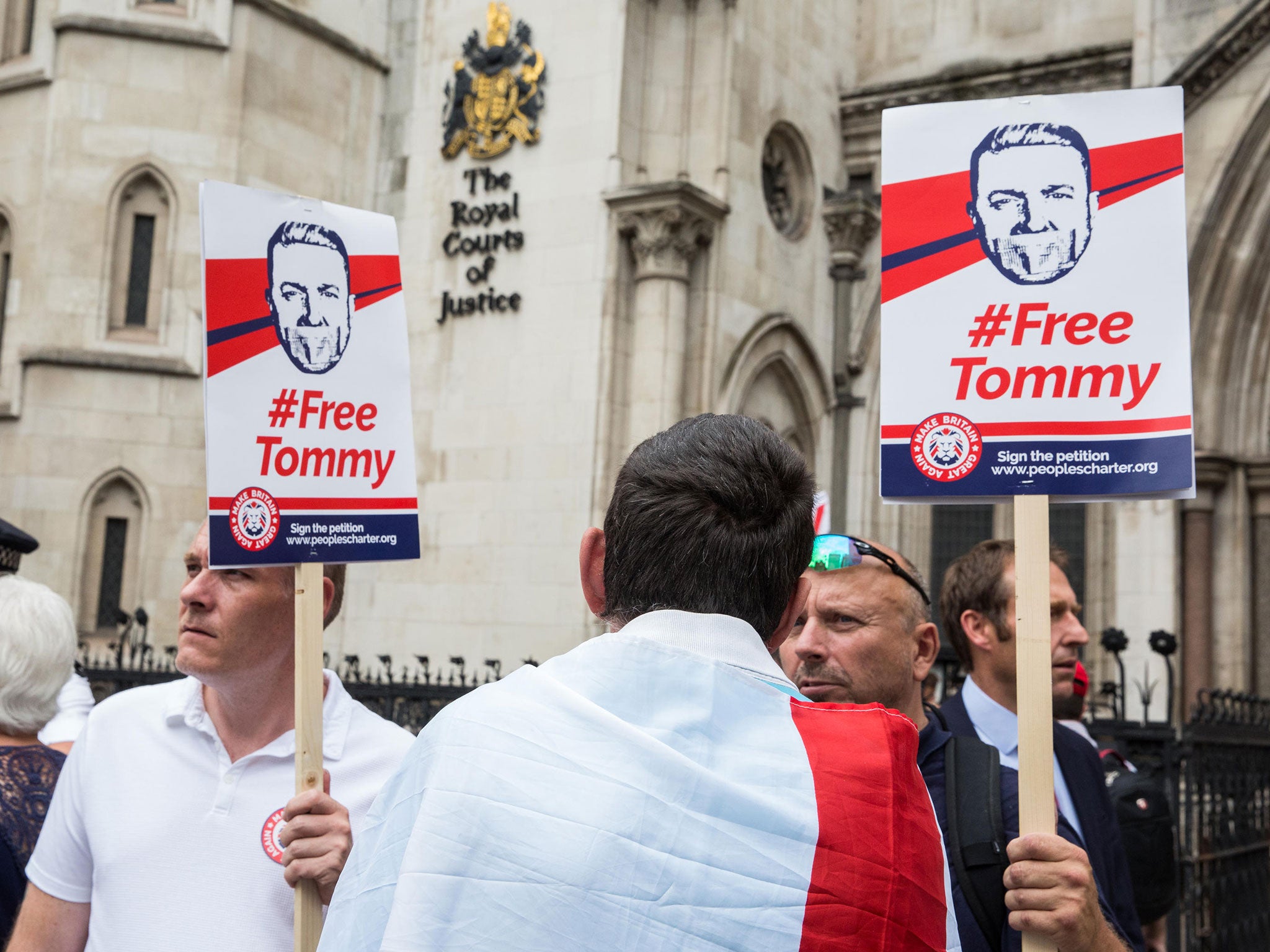Tommy Robinson: Old Bailey judge to decide whether to jail EDL founder again for alleged contempt of court
Robinson was jailed in May over incident in Leeds but freed last month because of 'procedural deficiencies'
Far-right figurehead Tommy Robinson faces being jailed for a second time for allegedly committing contempt of court.
The 35-year-old, whose real name is Stephen Yaxley-Lennon, will appear at the Old Bailey in London on Thursday.
::Follow the latest updates from the Old Bailey as Tommy Robinson attends new hearing::
The Recorder of London, Judge Nicholas Hilliard QC, will consider allegations that he “published a matter which is likely to cause contempt of court” during ongoing trials in Leeds.
Robinson was originally jailed for 13 months over a Facebook Live video he broadcast from outside the city’s crown court in May, but the findings were overturned last month and he was freed.
Court of Appeal judges ordered a rehearing, saying the “alleged contempt was serious and the sentence might be longer than that already served”.
Robinson is also accused of breaching the conditions of a three-month suspended sentence he was handed for a separate contempt offence in Canterbury in 2017.
In a video posted on his official Facebook page on 20 September, Robinson vowed that he would not apologise or make any admission of guilt, and said he was expecting to be jailed again.
Supporters have organised a protest to start outside the Old Bailey ahead of the hearing on Thursday morning and a significant police presence is expected to separate them from counter-demonstrators.

Two large “Free Tommy” protests in London saw disorder break out earlier this year, with police attacked and demonstrators performing Nazi salutes and blockading a bus driven by a Muslim woman.
Robinson was released from prison on 1 August, when high-profile backers including the Ukip leader Gerard Batten, Dutch opposition leader Geert Wilders and the former Breitbart London editor Raheem Kassam hailed the verdict as a victory for “freedom of speech”.
The Court of Appeal found that procedural failings by the judge who jailed Robinson for 13 months at Leeds Crown Court “gave rise to unfairness” and meant proceedings were “fundamentally flawed”.
The Lord Chief Justice and two other judges said that while Geoffrey Marson QC was right to bring Robinson before him to have the Facebook video deleted and protect jury deliberations, the case was dealt with too fast and did not follow criminal procedure rules.
“There was no clarity about what parts of the video were relied upon as amounting to contempt, what parts the appellant accepted through his counsel amounted to contempt and for what conduct he was sentenced,” their judgment read.
“There should have been an adjournment to enable the particulars of contempt to be properly formulated and for a hearing at a more measured pace.”
The Court of Appeal found that Judge Marson “proceeded on the basis that the appellant had admitted his contempt” after Robinson’s lawyer apologised on his behalf, but he was not asked to respond to the particulars of the allegations himself.
The failings meant that Robinson’s family circumstances were not considered and he was recorded as a criminal, rather than civil, prisoner and deprived of visits, free communications and other freedoms he should have been allowed.
Judges did not say Robinson had not committed contempt of court, and accused him of delaying the appeals “for tactical reasons and collateral advantage”.
Their judgment suggested that Robinson may have committed contempt both by violating reporting restrictions and with “generally prejudicial remarks”, including on the “ethnic and religious backgrounds of the defendants”.
“These comments were, at least potentially, capable of amounting to a freestanding contempt of court,” it continued.
“The alleged contempt was serious and the sentence might be longer than that already served if a finding is again made against [Robinson].”
The Court of Appeal refused to quash a separate finding of contempt from Canterbury Crown Court in May 2017, saying criticism by Robinson’s legal team “had no substance”.
In that case he was handed a three-month suspended sentence for trying to film defendants inside the court during jury deliberations, after being told to stop and warned filming was against the law.
Judge Heather Norton said at the time: “This contempt hearing is not about free speech…it is about justice, and it is about ensuring that a trial can be carried out justly and fairly.”
Contempt of court laws aim to ensure fair trails in Britain by preventing juries from being swayed by information from outside the hearing, and apply to all forms of online and offline publications.
The offences are covered by a “strict liability rule”, meaning that intent and knowledge of committing them are not necessary for a conviction.
But Robinson’s case has become a cause celebre for far-right groups around the world, who characterise his treatment as a crackdown on “free speech”.

International protests started almost immediately after Robinson was jailed and he received almost £20,000 in Bitcoin during his imprisonment.
Robinson's following on Facebook and YouTube also surged and was publicly supported by figures including the US president's son, Donald Trump Jr.
“I’d have done six months just for that recognition,“ he purportedly wrote in a letter from prison.
As Robinson’s website and his former employees at Rebel Media asked for donations, US think-tank the Middle East Forum also claimed it was paying his legal defence.
Donald Trump’s ambassador for international religious freedom reportedly lobbied the British government over Robinson’s case, while former Breitbart executive chairman Steve Bannon used it to publicise ”The Movement“, which will seek to influence European politics.
Robinson characterises himself as an “independent reporter”, but the Court of Appeal found that his interest in both the Canterbury and Leeds trials was “ethnicity or religion of the defendants”.
He reached national prominence after founding the far-right English Defence League in 2009, later leaving the organisation and attempting to set up a British chapter of the German anti-Islam group Pegida.
Robinson’s activity has been interrupted by jail sentences for entering the US with a false passport, and mortgage fraud, while he has also been convicted of offences including common assault and threatening and abusive behaviour.
Robinson was employed by the alt-right Canadian website Rebel Media but quit and now funds his videos through donations from supporters around the world.

